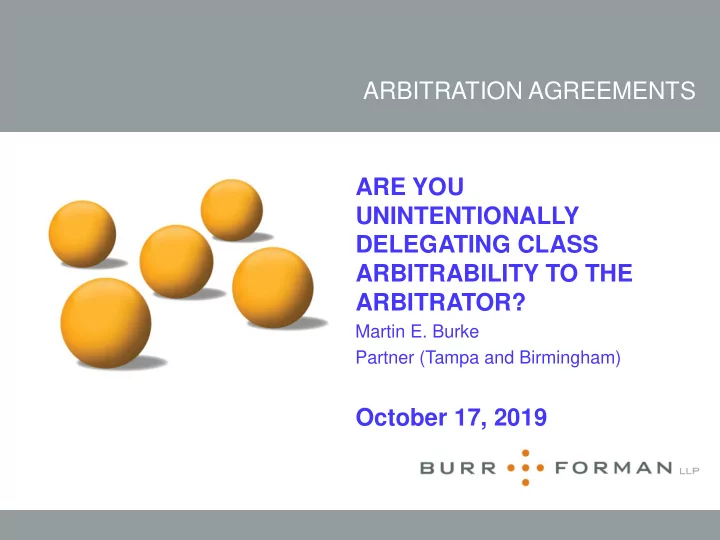

ARBITRATION AGREEMENTS ARE YOU UNINTENTIONALLY DELEGATING CLASS ARBITRABILITY TO THE ARBITRATOR? Martin E. Burke Partner (Tampa and Birmingham) October 17, 2019
Prefatory Remarks • Who decides whether to allow arbitration of class claims? • Before answering “whether” to allow class claims, we must resolve “who” decides—court or arbitrator? • The threshold question remains regardless of whether the arbitration agreement contains a class action waiver clause. • See Henry Schein, Inc. v. Archer & White Sales, Inc. , 139 S. Ct. 524 (2019) (holding that courts must enforce agreements to delegate arbitrability issues to an arbitrator, even if the court concludes that a claim of arbitrability is “wholly groundless”)
Prefatory Remarks • Why does it matter? • Limited right of review of arbitrator decisions • “Our powers of review [of arbitrator’s decision] have been described as among the narrowest known to the law. In fact, errors in either the arbitrator’s factual findings or his interpretation of the law (unless that interpretation shows a manifest disregard of controlling law) do not justify review or reversal on the merits of the controversy.” Dish Network L.L.C. v. Ray , 900 F.3d 1240, (10 th Circuit 2018)(internal cites and quotations omitted).
The Standard for Decision “The question whether the parties have submitted a particular dispute to arbitration, i.e. , the ‘ question of arbitrability ,’ is ‘an issue for judicial determination [u]nless the parties clearly and unmistakably provide otherwise .’” Howsam v. Dean Witter Reynolds, Inc. , 537 U.S. 79, 83 (2002)(quoting AT&T Techs., Inc. v. Communications Workers of America , 475 U.S. 643, 649 (1986)) (emphasis added). •HAVE YOU “CLEARLY AND UNMISTAKABLY” PROVIDED THAT THE ARBITRATOR, NOT THE COURT, DECIDES WHETHER CLASS CLAIMS ARE ARBITRABLE?
THE PROBLEM OF INCORPORATING RULES ARBITRATION AGREEMENT “Any claim, controversy or dispute arising out of or in any way related to this agreement shall be resolved by arbitration under the then current procedures of the American Arbitration Association or the JAMS Streamlined Arbitration Rules and Procedure.”
THE PROBLEM OF INCORPORATING RULES “The arbitrator shall have the power to rule on his or her own jurisdiction, including any objections with respect to the existence, scope or validity of the arbitration agreement.” Rule 6(a) of the AAA National Rules for the Resolution of Employment Disputes .
THE PROBLEM OF INCORPORATING RULES “Jurisdictional and arbitrability disputes, including disputes over the formation, existence, validity, interpretation or scope of the agreement under which Arbitration is sought, and who are proper Parties to the Arbitration, shall be submitted and ruled on by the Arbitrator. The Arbitrator has the authority to determine jurisdiction and arbitrability issues as a preliminary matter.” Rule 8(c) of the JAMS Streamlined Arbitration Rules and Procedure.
THE PROBLEM OF INCORPORATING RULES So has our arbitration agreement, incorporating AAA or JAMS rules, “ clearly and unmistakably ” evidenced that the parties intended to delegate matters of arbitrability (including arbitrability of class claims) to the arbitrator?
THE CIRCUIT SPLITS NO! ( Particular delegation of class arbitrability needed) Catamaran Corp. v. Towncrest Pharmacy , 864 F.3d 966, 972-73 (8 th Cir. • 2017)(“The risks incurred by defendants in class arbitration . . . and the difficulties presented by class arbitration . . . all demand a more particular delegation of the issue than we may otherwise deem sufficient in bilateral disputes.”) (emphasis added). • Chesapeake Appalachia, LLC v. Scout Petroleum, LLC , 809 F.3d 746, 762- 63 (3d Cir. 2016). Dell Webb Cmtys., Inc. v. Carlson , 817 F.3d 867, 876-77 (4 th Cir. 2015). • • Reed Elsevier, Inc., ex rel. LexisNexis Div. v. Crockett , 734 F.3d 594, 599- 600 (6 th Cir. 2013).
THE CIRCUIT SPLITS YES! ( Rejecting particular delegation requirement) Spirit Airlines, Inc. v. Maizes , 899 F.3d 1230 (11 th Cir. 2018)(holding that • adoption of AAA’s Supplementary Rules for Class Arbitrations delegated class arbitrability issue to arbitrator and rejecting other circuits’ “higher burden for showing ‘clear and unmistakable’ evidence for questions of class arbitrability”). • Wells Fargo Advisors, L.L.C. v. Sappington , 884 F.3d 392, 395 (2d Cir. 2018). Robinson v. J&K Admin. Mgmt. Servs., Inc. , 817 F.3d 193, 196 (5 th Cir. • 2016). Dish Network, L.L.C. v. Ray , 900 F.3d 1240 (10 th Cir. 2018). •
SUPREME COURT HINT The Supreme Court recently held that an ambiguous arbitration agreement cannot be resolved in favor of class arbitration through state rules of construction, since class arbitration is generally not contemplated by the FAA, and “courts may not infer consent to participate in class arbitration absent an affirmative contractual basis for concluding that the party agreed to do so.” Lamps Plus, Inc. v. Varela , 139 S. Ct. 1407 (2019)(internal quotes and citations omitted).
PRACTICE POINTER Your arbitration agreement should contain not only a class action waiver clause, but also a specific provision saying that regardless of any incorporated rules governing the arbitration, THE SPECIFIC ISSUE OF CLASS ARBITRABILITY SHALL BE FOR THE COURT TO DECIDE, NOT THE ARBITRATOR.
QUESTIONS? Martin E. Burke | 813-367-5718 | mburke@burr.com 800.GET.BURR | www.burr.com | www.ResultsMatterRadio.com
Recommend
More recommend